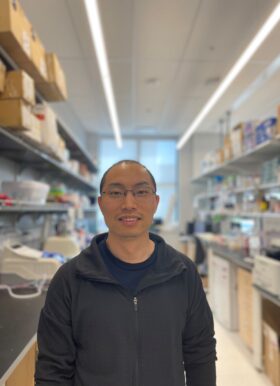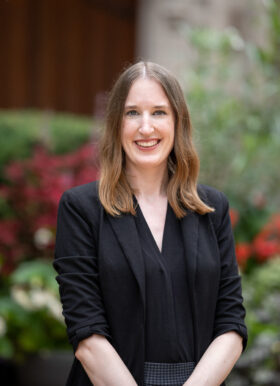
Felipe Almeida de Pinho Ribeiro, PhD
My lab investigates the mechanisms by which sensory neurons shape immunity and how these neuroimmune interactions contribute to the pathogenesis of human diseases. We combine techniques from neuroscience and immunology, mouse models of human diseases (infectious and non-infectious), and in vitro cultures of sensory neurons and immune cells to uncover the details of this neural control of immunity and to identify new approaches to treating immune-related diseases by targeting the sensory nervous system.

Gengsheng (Allison) Chen, PhD
Dr. Gengsheng Chen is a Senior Scientist in the department of Radiology at Washington University in St. Louis. She completed her PhD in Computational Biophysics at University of Missouri, Columbia, which was followed by a three year T-32 postdoc training in Genetic Epidemiology. She has been working with Dr. Benzinger since 2018, where she is focused on how baseline and longitudinal biomarkers predict cognitive decline for individuals with early stage Alzheimer disease. She is also studying brain network using graph theory and works with Dr. Benzinger as well as Dr. Cruchaga to investigate genetic risk factors for Alzheimer disease progression.
- Email: allisonchen@wustl.edu

Abhi Iyer, PhD
Abhi earned her Ph.D. in Immunology from Indiana University School of Medicine, where she investigated cytokine signaling pathways involved in lipid antigen presentation to innate lymphocytes called Natural Killer T (NKT) cells. Her interest in neuroimmunology led her to study CD4+ T cell-mediated motor neuron survival in amyotrophic lateral sclerosis (ALS) and peripheral nerve injury during her postdoctoral training at IUSM. She later joined Washington University in St. Louis, contributing to preclinical testing of antisense oligonucleotides targeting astrocytic α2-Na+/K+ ATPase in ALS. Currently, in the Karch Lab, Abhi investigates microglia-specific genetic risk factors for primary tauopathies, Alzheimer’s disease and related dementias by leveraging human microglia-like cells differentiated from patient-derived induced pluripotent stem cells.
- Email: iyera@wustl.edu

Eva Klinman, MD, PhD
Dr. Eva Klinman is an Instructor in Neurology and works in the lab of Dr. Andrew Yoo. She completed her neurology residency and fellowship in movement disorders at WashU. During her PhD at UPenn she studied organelle transport and microtubule motor proteins in an ALS system. In the Yoo lab, she is studying the contribution of mitochondrial dysfunction and cytoskeletal disarray to the onset and progression of neurodegeneration. In her free time, she enjoys playing with her puppy (Midna), her 30+ freshwater fish, and painting fun designs on her nails.
- Email: eklinman@wustl.edu

Tom Lin, PhD
Dr. Tom Lin is an instructor in the Department of Biochemistry and Molecular Biophysics, working with Dr. Benjamin A. Garcia. He completed his PhD research in Medicinal Chemistry at the University of Tennessee and postdoc training in Chemical Proteomics at the University of Pennsylvania. His primary research focuses are the discovery, biological functions, and therapeutical potentials of posttranslational arginylation using chemical, proteomic, and biochemical approaches. One of his main projects is to unveil the roles of arginylation in the progression of tauopathies and Alzheimer disease.
- Email: zongtao@wustl.edu

Michelle Rudman, MD, PhD
Michelle Rudman, MD, PhD is a postdoctoral fellow in aging and dementia at the Washington University Knight ADRC. She obtained her combined MD/PhD degree from the University of Miami Miller School of Medicine in 2019 and completed her adult neurology residency training at Washington University/Barnes Jewish Hospital in 2023. Dr. Rudman sees patients in the Washington University Memory Diagnostic Center and conducts research on Alzheimer’s disease in the laboratory of Dr. David M. Holtzman. Dr. Rudman’s research focuses on understanding the ways in which the adaptive immune response may be exacerbating neuroinflammation and neurodegeneration in a mouse model of tauopathy. This research has important implications for understanding the ways in which the immune response contributes to Alzheimer’s disease-related pathology.

Wade Self, PhD
Dr. Wade Self is an Instructor in the Department of Neurology at Washington University School of Medicine in St. Louis. He has spent the past decade working with research teams in the academic and industrial setting to translate understanding of the basic neurobiology of disease into disease-modifying treatment strategies for Amyotrophic Lateral Sclerosis and Alzheimer Disease. Wade’s current work aims to understand mechanisms outside of the central nervous that modify neuroimmune interactions in models of Alzheimer Disease-associated pathologies to discover new therapeutic targets and test innovative approaches for AD treatment and prevention.

Emily Willroth, PhD
Dr. Emily Willroth is an Assistant Professor in the Department of Psychological and Brain Sciences. She investigates how components of psychosocial wellbeing (e.g., life satisfaction, sense of purpose, social connection) vary and change across time, both in the short-term from moment-to-moment and in the long-term across the adult lifespan. She applies insights from this research to examine links between psychosocial wellbeing and important health outcomes in middle and older adulthood, such as cognitive decline, dementia, and stroke.
- Email: emily.w@wustl.edu